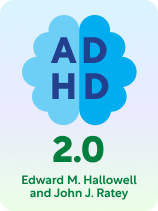
What are you really good at? What do you enjoy so much that it can make you lose track of time?
If you have ADHD, you can achieve incredible things when you take on challenges that align with your strengths and passions. Edward Hallowell and John Ratey explain how and why this works in their encouraging book ADHD 2.0.
Keep reading to learn how to thrive with ADHD by leveraging your natural interests.
How to Thrive With ADHD
The authors describe ADHD as a condition of opposite extremes—for every exceptional challenge that people with ADHD face, they have an exceptional strength to balance it. Here are a few examples of ADHD benefits:
- People with ADHD can hyperfocus.
- People with ADHD are energetic.
- People with ADHD are emotional.
- People with ADHD are highly creative.
Hallowell and Ratey discuss how to thrive with ADHD by taking advantage of the strengths to accomplish great things. They note that people with ADHD love a good challenge. Faced with a difficult problem, people with ADHD can enter hyperfocus and often become more productive than their neurotypical peers.
However, it has to be the right kind of challenge: something that engages their interest as well as pushes their limits. For instance, moving heavy rocks might be challenging, but it isn’t interesting—unless they first have to figure out how to move the rocks, which allows them to exercise their natural creativity.
(Shortform note: Enjoying a challenge isn’t unique to ADHD; many people enjoy tackling a task that’s hard enough to be interesting, but not so hard that it feels hopeless. So, what’s the right level of difficulty? In Atomic Habits, James Clear says the ideal challenge is one where you succeed about half of the time. If a challenge is much easier than that, you’ll get bored; if it’s much harder, you’ll get frustrated.)
The authors say that people with ADHD often have a couple of things they’re exceptionally good at or extremely passionate about. These things naturally hold their interest and therefore can be the key to making the most of their ADHD strengths.
For adults with ADHD, finding a job that involves these interests is crucial to their happiness, their sense of fulfillment, and often their financial stability. Their success or failure has less to do with how difficult the job is than with how well it holds their attention. They might find a simple but boring job far more difficult than a complicated but interesting one.
(Shortform note: If you have ADHD, you might find that you struggle at work for reasons that have nothing to do with your ability to do the job. For example, if you struggle with time management and schedules, you’ve likely been branded as unreliable at least once in your career. Similarly, your difficulty concentrating might have given you a reputation for being absentminded or careless, when in reality, the problem is that your job isn’t engaging your interest. Because of struggles like these, people with ADHD tend to switch jobs or get fired more often than their neurotypical peers.)
For children with ADHD, the same principle holds true: They’ll do much better in school if the schoolwork leverages their natural interests. For example, a child with a natural interest in music might find math more interesting if someone explains how much math is involved in music—time signatures, beats and rhythms, how musical notes represent fractions of a measure, and so on.
(Shortform note: If you’re a parent of a child with ADHD, how can you support them in school? It’s not always possible to align schoolwork with your child’s interests, which can make school and especially homework a struggle. It often helps a child with ADHD stay on task if they have a set time and place to do their homework every night. Also, children with ADHD tend to get distracted and frustrated easily, so schedule homework time for when you can be nearby to offer encouragement and guidance as needed. Finally, it’s worth checking what accommodations your child’s school can offer. Some common accommodations include extra time for exams, frequent breaks to get up and move around, and extra help with staying organized.)
However, some people may not even realize what their natural interests are. In that case, the authors suggest they make a list of everything they’re good at and everything they love doing—in particular, they should write down anything they find easy that other people seem to struggle with. That list can become a guide to finding jobs they’ll enjoy and excel at.
(Shortform note: This advice comes with a caveat: ADHD interests are often intense but short-lived. In other words, if you have ADHD, you might write down something you love doing now (say, woodworking), only to find that it no longer holds your interest in a month or a year. Therefore, when making such a list, try to emphasize activities you’ve loved for many years already, since (hopefully) that’s a sign your interest won’t fade anytime soon.)
Exercise: Identify Your Interests
List three to five of your interests—activities you love doing, topics you love learning about, or skills that come naturally to you. (Remember that interest is the most important factor for holding an ADHD person’s attention and is still helpful for neurotypical people. So, this list could be a guide to finding a new hobby or job that you’ll excel in.)

———End of Preview———
Like what you just read? Read the rest of the world's best book summary and analysis of John Ratey and Edward Hallowell's "ADHD 2.0" at Shortform.
Here's what you'll find in our full ADHD 2.0 summary:
- How people can thrive because of—not in spite of—having ADHD
- The biological causes of ADHD and its most prominent symptoms
- Ways to minimize ADHD's downsides and maximize the benefits






